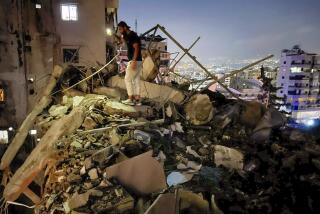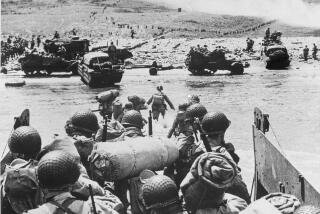Israeli General Recounts Risky ’81 Raid on Iraq Nuclear Reactor
- Share via
WASHINGTON — Two decades after Israeli warplanes destroyed Iraq’s only nuclear reactor, the air force general who commanded the raid has disclosed that Israel’s intelligence community had fought the mission, arguing that it was too risky.
In a rare interview marking the 20th anniversary of the June 1981 precision bombing, David Ivry said the intelligence chiefs believed that the raid was unlikely to succeed--and that even if it did, it would retard Iraq’s nuclear weapons program by no more than five years.
But, according to Ivry’s account, then-Prime Minister Menachem Begin overrode the objections of the intelligence agencies--an unusual step in a country where spies enjoy tremendous prestige--because he had concluded that Iraq was poised to produce a nuclear bomb and that no other country would stop it.
Most of the details of the raid’s planning and execution were classified as state secrets by the Israeli government. But Ivry, currently Israel’s ambassador to the United States, said he now feels free to address some of those matters, including the political and technological obstacles that had to be overcome.
Coming less than five years after the daring Israeli rescue of more than 100 hostages aboard a hijacked plane at Uganda’s Entebbe Airport and the Carter administration’s failed attempt to rescue 52 hostages at the U.S. Embassy in Tehran, the Baghdad raid inflated the near-mythical reputation of the Israeli military. But lately, with Israel’s F-16 bombing raids on Palestinian cities, the heroic atmosphere has been fading.
Reverberations Felt in Persian Gulf War
Ivry said the 1981 attack contributed to the restraint that Israel showed during the 1991 Persian Gulf War when it came under attack by Saddam Hussein’s Scud missiles. The United States, fearing that Israeli participation would destroy the precarious U.S.-Arab coalition fighting Iraq, pleaded with Israel to stay on the sidelines.
The decision to forgo retaliation was not popular in Israel. But Ivry said the restraint was possible only because the country had demonstrated a decade earlier that it could attack Baghdad if it wished.
“Once we did it, it wasn’t a question of whether the Israeli air force could do it,” he said. “We knew we could. It was just a political question of yes or no.”
Ivry said the 1981 raid faced a daunting array of challenges: Internal Israeli politics. Certain international condemnation. Concern about the fuel capacity of the F-16 jets--so limited, it seemed to put the Baghdad plant out of range.
In the immediate aftermath of the raid, Begin and other Israeli officials focused on the successful destruction of the nuclear facility and sought to deflect charges that the raid violated international law.
Planning for the attack began in 1978, shortly after Begin took office, Ivry said. Information was extremely closely held. Begin briefed members of his Cabinet and the top military leadership. In the air force, only Ivry, the pilots and support personnel involved in the attack were told.
Even so, Shimon Peres, now Israel’s foreign minister but then leader of the parliamentary opposition, found out about the plan. Ivry said Peres objected strongly in a private meeting with Begin, delaying the operation for almost a month.
On May 10, with the aircraft already loaded with fuel and bombs, Peres protested again to Begin’s office--demanding that the raid be called off.
“We stopped them on the runway,” Ivry said of the warplanes.
Eventually, Peres was persuaded to keep the government’s secret and issue no public protest. That allowed the raid to proceed.
Begin had insisted on unanimous support from his coalition Cabinet before he would go ahead, and Ivry said it took several months to get all of the Cabinet officials on board.
Some, such as retired general and Housing Minister Ariel Sharon, now Israel’s hard-line prime minister, signed on at once. But others held out. Yigael Yadin, then deputy prime minister, was the last to be convinced. Yadin, an internationally renowned archeologist, was the commander of the Haganah militia that fought Israel’s War of Independence and was the second army chief of staff of the Israeli state.
But the political problems were mild compared with the technological difficulties, Ivry said.
Most daunting was the distance to the target: about 560 miles, almost all of it over hostile Arab territory. Theoretically, the U.S.-made F-16 has a combat radius of about 575 miles, meaning the distance it can travel to the target and back on one load of fuel.
There would be virtually no margin for an emergency and no reserves to permit the planes to linger over the target.
Aerial refueling was out of the question, Ivry said, because tanker planes could not be expected to operate over hostile territory.
Ivry said his pilots rehearsed the raid for months, flying over the Mediterranean to determine the maximum range of each plane when it was loaded with bombs. He said the tests indicated that the planes could be sure of making it to Baghdad and back only if they used external fuel tanks that could be discarded when empty, carried only two bombs each and did without electronic jamming gear intended to combat the radar of enemy antiaircraft batteries.
To save a few additional drops of fuel, Ivry said, the tanks were topped off after the planes had reached their positions for takeoff, to replace the fuel used in taxiing.
The air force had enough external fuel tanks for eight planes, he said. With two gravity bombs per plane, the raid could muster just 16 free-fall bombs, without the radar or laser-guidance systems routinely used by the United States and its NATO allies.
Nevertheless, all but three of the bombs hit the French-built nuclear plant, Ivry said, destroying it.
The raid was conducted at sunset on a Sunday. Israeli officials said at the time that Sunday was picked because it was the scheduled day off for the French technicians assigned to the facility.
International Criticism Later Turns to Praise
But Ivry said there was another reason behind the timing: There was enough light to find the target, but if any of the planes were shot down, there would be hours of darkness to cover a rescue operation. He said helicopters were deployed along Israel’s eastern border, ready to be called upon to pick up a downed pilot. The helicopter crews were told to be poised for a dangerous mission but were not told about the raid.
As it turned out, all the planes returned safely.
On one matter, the warnings of Israeli intelligence officials proved valid. The international criticism of the raid was sharp and immediate--with complaints coming from Washington, Moscow, Paris and throughout the Arab world. The U.N. Security Council voted to “strongly condemn” the raid. Unlike with most U.N. resolutions critical of Israel over the years, the United States did not use its veto to thwart this one.
The Pentagon halted delivery of F-16s for a while, then quietly resumed the shipments.
Then-President Reagan was ambivalent. A little more than a week after the attack, he said Israel apparently violated its arms contract with the United States, which limited Israel’s use of U.S. weapons to “defensive” operations. But the president said that perhaps the Israelis genuinely believed that the raid was defensive.
These days, there are no more doubts in Washington.
Ivry said he met President Bush at a recent White House ceremony. The president greeted him as “the general who did that attack on that nuclear reactor,” Ivry said.
In his office in the Israeli Embassy, Ivry has a wall full of trophies from his days in the air force. Prominent is a grainy black-and-white photograph, taken by a satellite in 1991, of the wreckage of the Iraqi reactor.
The photo is signed by then-Defense Secretary Dick Cheney “with thanks and appreciation” for Israel’s bombing of the plant, “which made our job much easier in Desert Storm.”
More to Read
Sign up for Essential California
The most important California stories and recommendations in your inbox every morning.
You may occasionally receive promotional content from the Los Angeles Times.













